
Health
Climate change is predicted to affect many aspects of human life in complex and interconnected ways. The impacts of climate change on human health and wellbeing can be both direct (e.g., exposure to extreme and unusual temperatures, drought, and flooding) and indirect (e.g., changes in air quality, food and water availability/quality, and patterns of infectious disease transmission). These effects are further compounded by a variety of biological, ecological and socio-political factors.
An extensive body of research has identified several factors that can adversely affect the vulnerability of human health and wellbeing to climatic factors, including age, gender, geographic location, socioeconomic status, occupation, health status and housing conditions, among others. Climate change is predicted to exacerbate these vulnerabilities, especially in the lower-income countries and resource-limited settings of the EMME region, which is also characterized by high rates of population growth, urbanization, political tension and migration.
(Click here to download the report in .pdf format)
Abstract from the Report of the Task Force on Health
Task Force
The impacts of climate change on health can be either direct (e.g., exposure to extreme and unusual temperatures, drought and flooding) or indirect (e.g., through changes in infectious disease epidemiology, and variations in the availability and/or quality of food, water and air). These effects are further compounded by a variety of biological (age, gender), ecological (pollution, disease-causing microbes, food and water contamination) and socio-political (socio-economic status, acclimation, occupation, health infrastructure, housing conditions) factors.
For countries in the Eastern Mediterranean and the Middle East (EMME) region, vulnerability to climate change is heightened by factors such as high rates of population growth and urbanization, an ageing population, political and military conflicts, mass population displacement and, in some cases, struggling economies. In this report, we summarise current knowledge regarding the effects of climate change on the health of the people living in the EMME region, with a particular focus on exposure to extreme temperatures, water shortage and food security, air pollution, VBDs and the health of displaced populations.
We identify gaps in knowledge and research infrastructures that, when addressed, will help us better understand and monitor the impacts of climate change on human health.
Finally, we offer policy suggestions which can help ameliorate some of these effects, especially among vulnerable individuals including pregnant women, the young, the elderly, people with chronic or pre-existing medical conditions and socially marginalised populations including the poor, malnourished and displaced, and those lacking basic resources and sanitation.
Corresponding Authors
Marco Neira, m.neira@cyi.ac.cy
George Christophides, g.christophides@cyi.ac.cy
Authors
Marco Neira, Climate and Atmosphere Research Center (CARE-C), The Cyprus Institute,
Nicosia, Cyprus
Kamil Erguler, Climate and Atmosphere Research Center (CARE-C), The Cyprus
Institute, Nicosia, Cyprus
Hesam Ahmady-Birgani, Department of Rangeland and Watershed Management, Faculty
of Natural Resources, Urmia University, Iran
Nisreen DaifAllah AL-Hmoud, Bio-Safety and Bio-Security Centre, Royal Scientific
Society, Jordan
Robin Fears, European Academies Science Advisory Council (EASAC)
Charalambos Gogos, School of Medicine, University of Patras, Patras, Greece
Nina Hobbhahn, European Academies Science Advisory Council (EASAC)
Maria Koliou, University of Cyprus Medical School, Nicosia, Cyprus
Leontios Kostrikis, Laboratory of Biotechnology and Molecular Virology, University of Cyprus, Nicosia, Cyprus
Jos Lelieveld, Climate and Atmosphere Research Center (CARE-C), The Cyprus Institute,
Nicosia, Cyprus; The Max Planck Institute for Chemistry, Mainz, Germany
Azeem Majeed, Department of Primary Care & Public Health, Imperial College London,
London, United Kingdom
Shlomit Paz, Department of Geography and Environmental Studies, University of Haifa,
Haifa, Israel
Yinon Rudich, Faculty of Chemistry, The Weismann Institute of Science, Rehovot, Israel
Amal Saad-Hussein, Environment and Climate Change Research Institute, National
Research Centre, Cairo, Egypt
Mohammed Shaheen, Damour for Community Development – Research Department,
Palestine
Aurelio Tobias, Institute of Environmental Assessment and Water Research (IDAEA),
Spanish Council for Scientific Research (CSIC), Barcelona, Spain
George Christophides, Climate and Atmosphere Research Center (CARE-C), The Cyprus
Institute, Nicosia, Cyprus; Department of Life Sciences, Imperial College London,
London, United Kingdom


